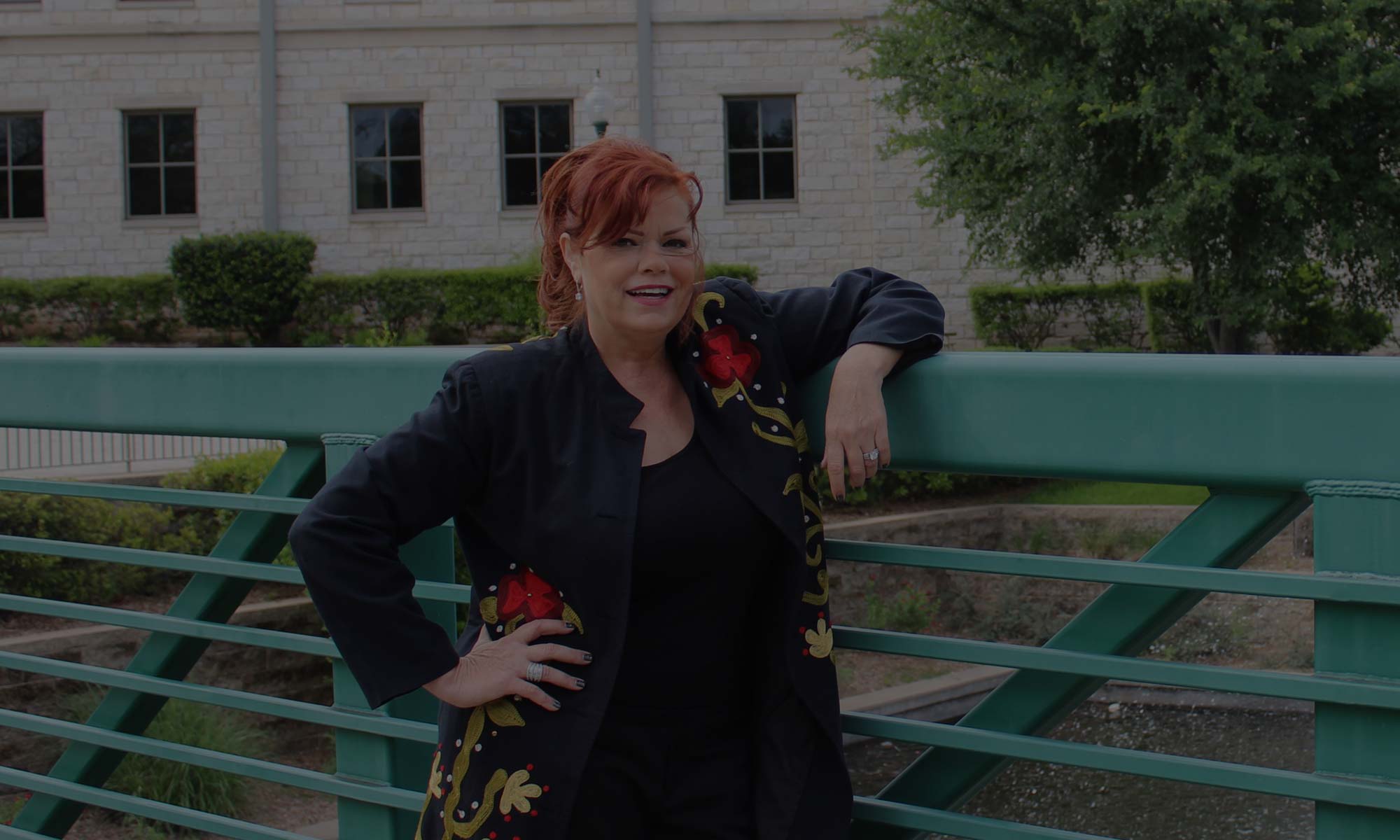No one is “comfortable about marrying with an inmate behind the glass.” Many of my clients never planned to marry in a Prison and much less to be separated by the glass.
On one rare occasion, I had a client nearly vomit due to her surprise and shock to see her future husband on the other side of the glass smiling at her. Walking into a visitation area at a Prison to marry is dramatically different from walking down an aisle.
The glass was not only unexpected to my client but also me as she was unaware of his status being “upgraded” due to an infraction. Walking in to find her fiancée behind glass literally took her breath away. Thankfully, I was right beside her to steady her the last few feet leading up to the glass.
Infractions can and do change an inmates status. At any point during the Prison wedding planning process, a change in the inmates status can prevent the inmate from being “on the other side of the glass” aka standing beside my client and I.
I spent several minutes trying to calm my client who had driven from Houston to Tennessee Colony before proceeding with her wedding ceremony. She was facing a long and lonely drive home and I wanted to comfort her as much as possible. Frankly, I wished she had brought someone with her to have a ride a long. Many of my client choose to bring friends or family with them and although no visitors are allowed inside the Unit, these guests are happy to wait on my client and I.
During the Prison wedding planning process, I become every Clients mother guiding them and directing them through the process whether they are male or female.
One of my Gatesville clients still calls me “Mama Wendy” and is planning his vow revewal with my team next year.
The intimacy of my Prison clients by far exceeds any amount of time spent with traditional clients. Why? Because from what to wear to what they can say or do, these unique clients rely heavily on me to get them through a confusing and time consuming process.
I would never ask a traditional client to send me a photo of what they plan to wear. For a Prison wedding though, this is a standard question. 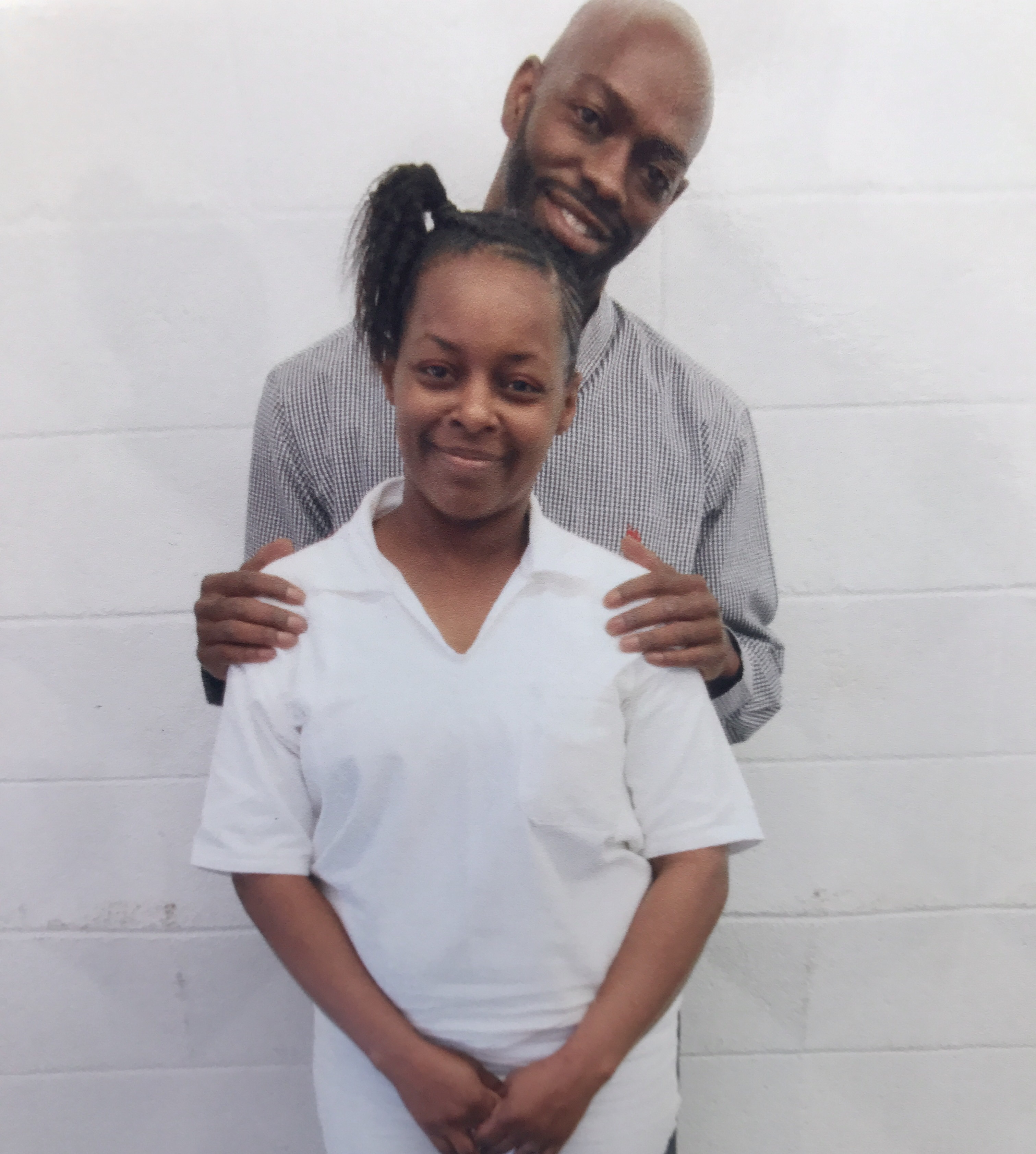
Glass can be upsetting at a ceremony when it isn’t expected. The majority of my clients wait months for their wedding to be scheduled.
Posing for a photo with glass separating my client and I from the inmate at the Unit, finding creative ways to pose was a bit of a hurdle. 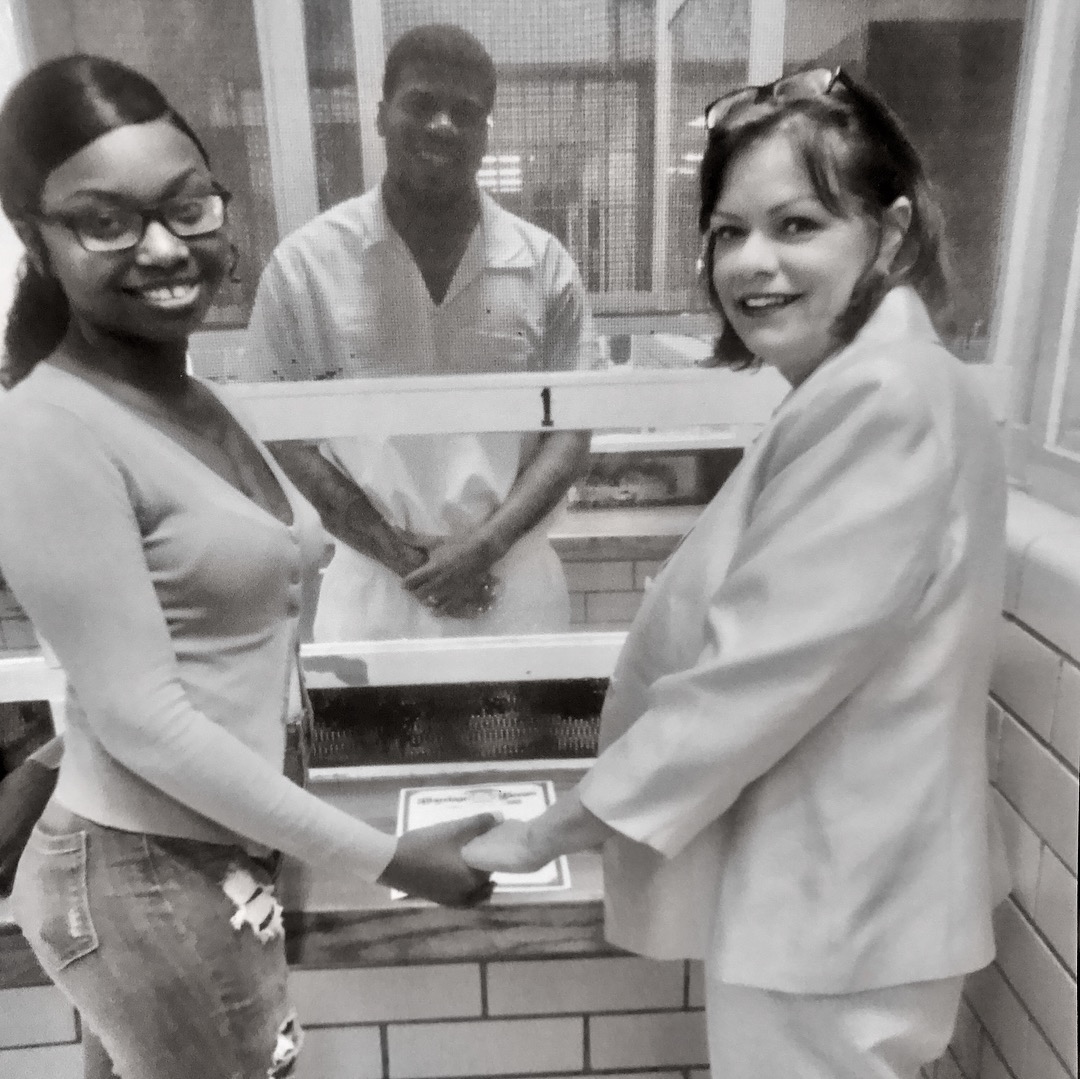
At TDCJ Ferguson Unit, Nikia wasn’t at all uncomfortable with the glass. Instead, I was. Why? It was my very first time to encounter glass separating my client from the inmate.
The photo below was taken by a guard and Nikia loved the way the glass “merged” their faces. It would be my first encounter with the glass but, it wouldn’t be my last as a Prison Wedding Officiant. 
The status of an inmate cannot be changed. If the inmate is a G4 or G5, a lifer or on death row, he or she will be behind the glass. Neither you or I can change that. We must accept that there will be glass separating you and I from the inmate and effectively move on.
There are a number of creative ways to address your Unit photos with the inmate behind the glass and I encourage you to do whatever will make you more comfortable when posing for your Unit wedding photo if (of course) photos of your wedding ceremony are offered at the Unit.
Some of the most memorable prison photos were taken by Andrew Lichtenstein. These photos show families visiting inmates and give a “different glimpse” of the domestic aspects of Prisons. How so? By giving a glimpse of the children, spouses, grandparents and parents of inmates visiting them.
Photos taken by Mr. Lichtenstein “on the other side of the glass” also feature children who may or may not understand why their parent is in prison.
To view the gallery of “life in prison” by Mr. Lichtenstein, click this link– Andrew Lichtenstein Life In Prison.
Before my readers “zip off an email” regarding Danny Lyon’s photos taken in Texas Prisons during the 60’s and featured in Conversations With The Dead, I’m well aware of the book and in fact, I’ve read the book, Conversations With The Dead published in 1971. It is a very emotional and heartbreaking read for anyone unfamiliar with the life of an inmate.
Danny Lyon has long been considered one of the most original and influential documentary photographers and has produced numerous highly collectible photobooks, mounted solo exhibitions at the Whitney Museum of American Art, The Art Institute of Chicago, The Corcoran Gallery in Washington DC, and won two Guggenheim Fellowships, a Rockefeller Fellowship, and ten National Endowment for the Arts awards. Lyon divides his time between New York State and New Mexico.
Other Danny Lyon photography books published by Phaidon include Danny Lyon: Memories of Myself (2009), Deep Sea Diver: An American Photographer’s Journey in Shanxi, China (2011), and The Seventh Dog (2014).
In an effort to educate those who may be unaware of Danny Lyon or the access that he was given by Dr George Beto to photograph Texas inmates, I will add include the link to Magnum Photography featuring photos from Conversations With The Dead and a warning that a few of Danny’s Prison photos are graphic and might be disturbing– Conversations With The Dead. Photography By Danny Lyon 1967-1968.
Between 1967 and 1968, Danny Lyon spent 14 months photographing inside six Texas prisons. He had already made his name with his sustained reportage from the frontline of the black civil rights struggle in the southern US states, but shooting inside high-security penitentiaries in Texas, where some of the inmates were facing the death sentence, was an altogether more soul-sapping experience. He would later describe it as heartbreaking.
The resulting book, Conversations With the Dead, was published in 1971 and immediately hailed as a classic of insider reportage.
Times have changed since the 60’s and 70’s as photographers and/or reporters are no longer given the access that Danny was.
Today, Unit photos are offered for sale at $3 each in quarters and occasionally given to visitors. Wedding photos at Sanders Estes Unit are emailed to myself and my client at no cost. Private Units do not offer photos at all and often Unit photos are grainy and out of focus. Guards are not professional photographers.
Prison Unit photos are often sent to inmates from loved ones who purchased them during their visit. Other Unit photos are often framed and kept in the homes of loved ones to remember their visit to a Unit while still others are put on refrigerator doors as a constant reminder of someone who may or may not ever be coming home.
Being married to an inmate who will never be granted parole is a difficult and serious decision. You will always be pulling the wagon alone. I discuss the aspects of marrying a “lifer” on a regular basis with clients.
How successful are my discussions? Hit and miss. Very few clients have changed their mind about marrying someone serving a life sentence. Why? Because they had given their choice to marry months and occasionally years of thought. Their commitment and sacrifice astounds me. It also astounds most other people.
Being a Prison Wife or Husband can be a lonely and expensive lifestyle. Your weekends are spent driving to a Unit and going through a search while waiting to see your loved one. Your holidays are spent alone. You jump to answer the next expensive phone call and you dedicate your life to the inmate. My clients give up far more than the inmate. They sacrifice on a regular basis to make their relationship work.
My clients are usually standing beside me at a Prison wedding unless the inmate is classified at a rank that prevents contact. The client and inmate are allowed to hold hands, hug (no inappropriate contact), and seal their marriage with a kiss (no open mouths).
My clients are advised to “keep it classy” by me long before their wedding ceremony. After all, we are in a prison and as such, I expect my clients to conduct themselves in an appropriate manner pertaining to the visitation code as well as the Administrative Directive pertaining to inmate wedding ceremonies. I.E. We follow the rules. 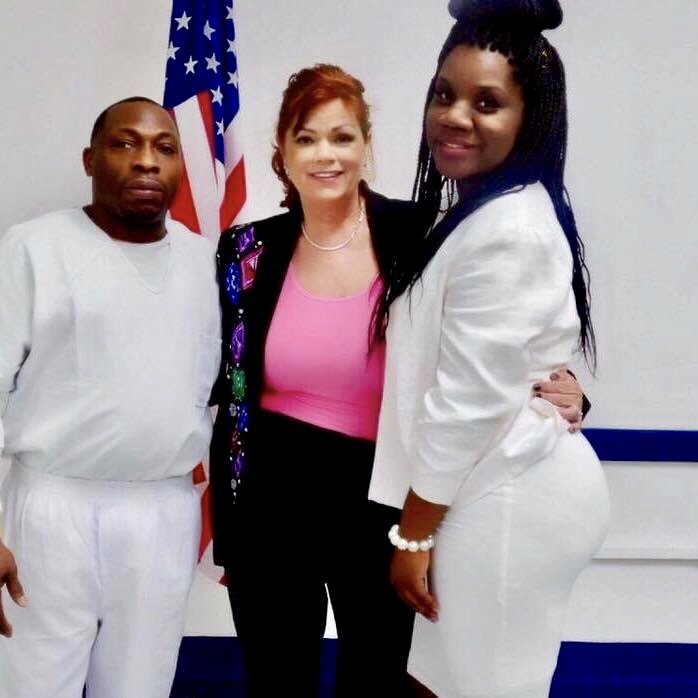
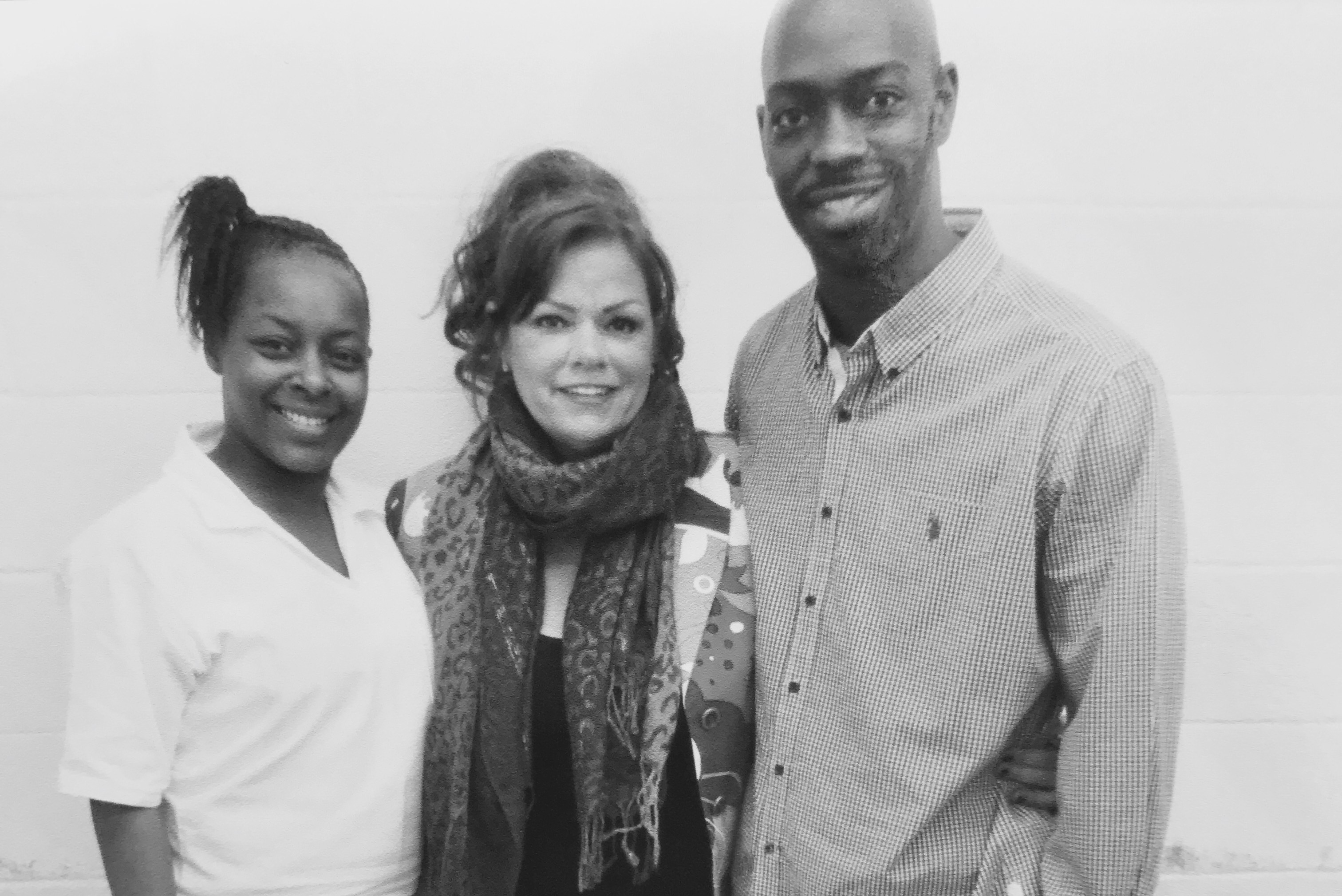
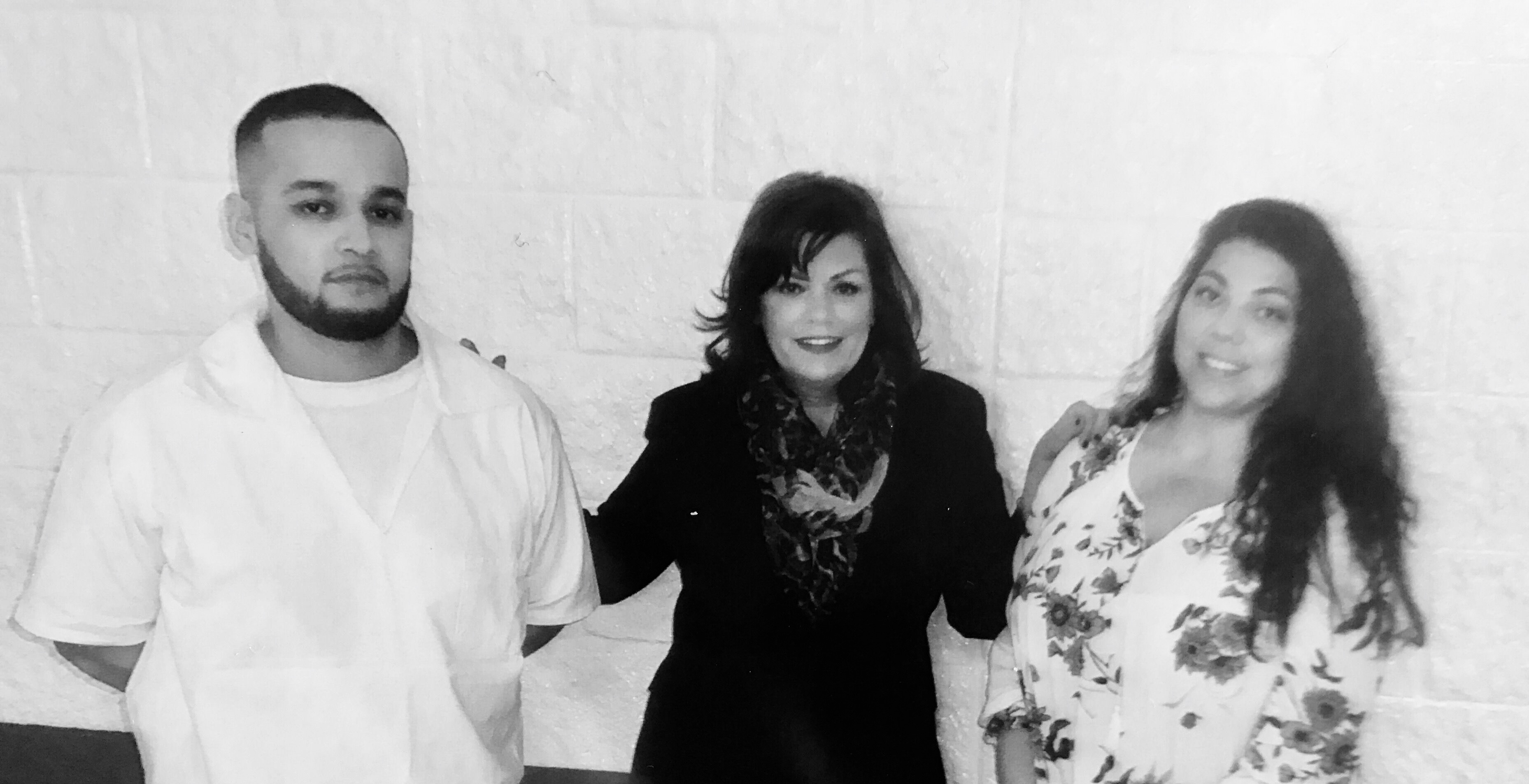

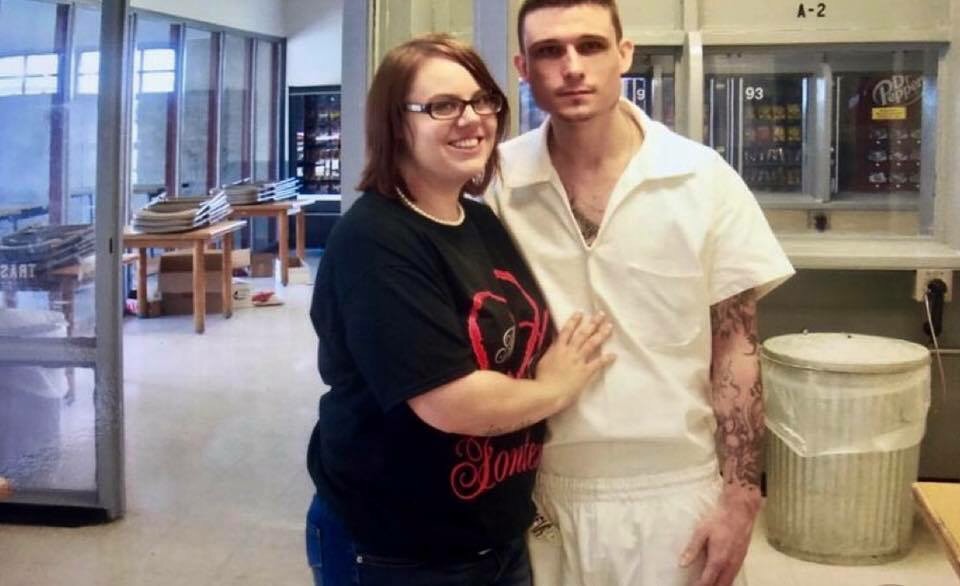
I completed a follow up interview with Kate, a journalist following the story of Luther and Mary a few days ago. If you missed my interview with Mary before her wedding to Luther, here’s the link– Wendy Wortham Interview With Mary Martin Wichita Falls, Texas.
Luther and Mary will never hold hands at a visit, hug or even a few months ago, seal their marriage with a kiss. I admitted that this struck me as somewhat sad to Kate because it did.
Mary’s photos and interview with me feature a woman thrilled to be marrying an inmate serving a life sentence. Anyone looking at my joyous bride would have no idea that her life would always be spent visiting Luther “on the other side of the glass.” Mary wearing my clothing or tiaras and holding one of my bouquets in photos taken by my niece, Leigh Ann “looks like any other happy bride.” The difference in Mary’s marriage versus my traditional clients isn’t lost on me. 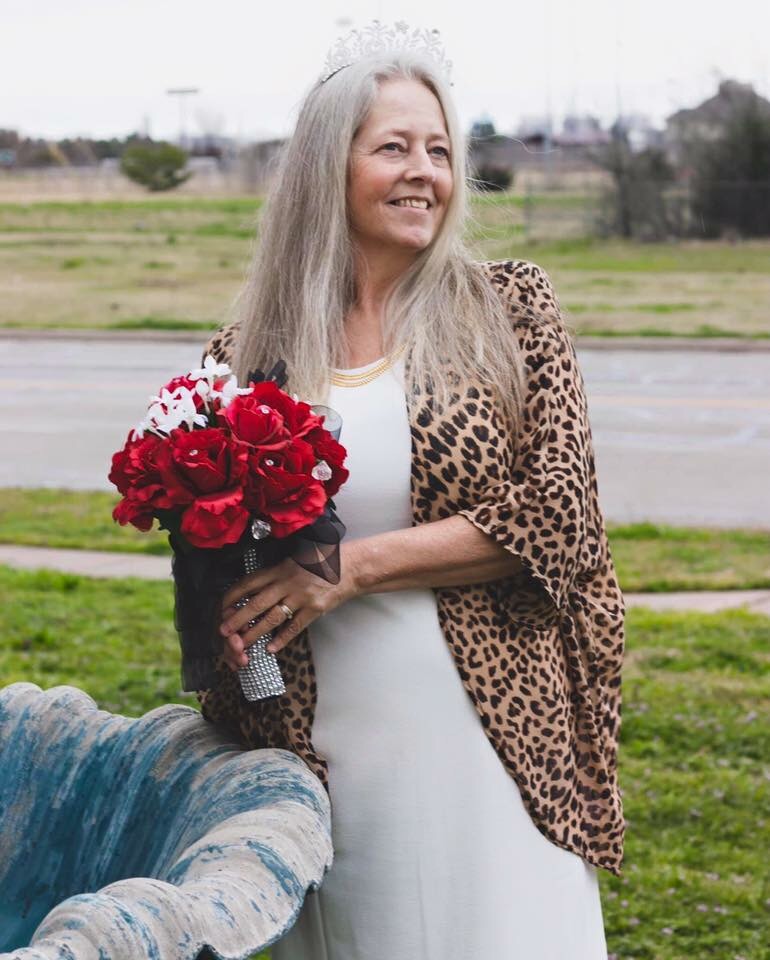 There won’t be a honeymoon. There won’t be dinners together at home discussing the workday. Their won’t be the normality or predictability that most married couples share. My clients accept the lopsided aspects of being married to an inmate.
There won’t be a honeymoon. There won’t be dinners together at home discussing the workday. Their won’t be the normality or predictability that most married couples share. My clients accept the lopsided aspects of being married to an inmate.
The glass is heavy and often dirty. Occasionally, there are also cracks where an inmate struck the glass. The cracks bother me. Why? Because someone drove hours to visit the inmate. Because someone went through the screening process and because someone who cared enough to come visit the inmate was on the other side of the glass when the inmate effectively punched it.
Acting as if the glass doesn’t make me uncomfortable in front of my clients is essential to performing my job functions. I put my anxiety in “the corner pocket.” 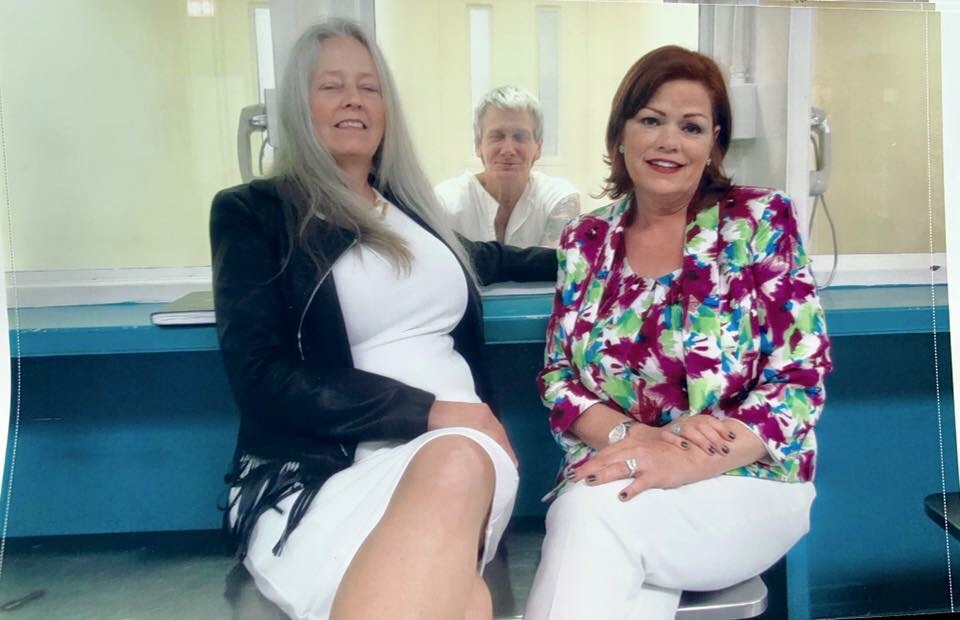
Marrying a couple when one of them is behind the glass will always be more emotionally challenging for me solely because the couple cannot touch one another. The glass will always be between my clients and their spouse and although many of them accept this without mourning the fact, I mourn for their loss of ever touching their spouse.
I am a seasoned wedding Officiant and planner. I’m also well educated regarding the limitations of legal remedies for couples who aren’t married.
I’ve seen far too many tragedies in my lifetime with couples who were not allowed to marry prior to the Supreme Court ruling legalizing same sex marriage.
Whether my clients are “inside a prison or outside of a prison,” the differences between both sets of clients are often staggering to the “outside world.”
There are many options “in the free world” that will never be offered in a Prison for a wedding ceremony. As a Prison bride or husband, it’s essential to accept the rules pertaining to your upcoming marriage and more importantly, to abide by said rules and regulations regarding inmate marriage ceremonies.
Accepting that my Prison Couples may never touch is just as sad for me as it is for them. Silently, I grieve their inability to have contact during the wedding ceremony.
I have also (for many years) Officiated deathbed wedding ceremonies for certain individuals that never expected to die who (upon their deathbed) want to protect their loved ones by ensuring their material possessions go to them rather than the state upon their death.
These incredible and extraordinary “situations” are equally sad for me but, I am well aware that many LBGT Couples have lost everything to their partners family after death because they had no legal recourse as a spouse.
Times have changed and Marriage now protects the surviving partner and more importantly, the assets the deceased wished to leave to them. Thank goodness that LBGT couples can now have insurance and the rights so many of my friends have lived a lifetime without.
I have thousands of friends in the LBGT community and for a number of years, officiated Unification Ceremonies for those who couldn’t legally marry in Texas as well as driving to Oklahoma to marry them in a state where marriage was legal long before Texas and many other states legalized same sex marriage.
Jeff Mosier of the Dallas Morning News interviewed me upon the ruling regarding same sex marriage.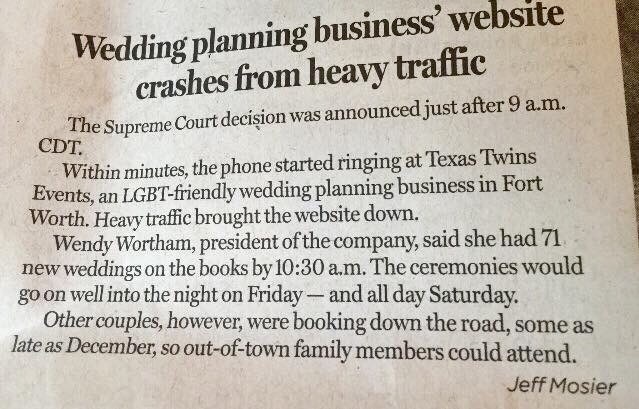
Previous to same sex marriage becoming legal, I also strongly suggested to my non married couples to obtain 5 legal documents that would protect their rights should one of them become ill or die.
The reason I continued to advise my LBGT connections to obtain documents was to protect them. I had written the blog titled “Five Legal Documents Every LBGT Couple Need” prior to Texas recognizing same sex unions because I had witnessed the fleecing of survivors in courthouses who effectively had No Legal Rights pertaining to burial or the assets of the Union.
I’m often amazed at the failure of non married couples who don’t take the time to sign a Living Will or to get a Body Disposition Affidavit in order or at the very least, to have a Power of Attorney document in place should an accident render your partner incapable of making decisions on their own.
But, not having any say regarding burial of your loved one can be a shocking surprise. It surprised my father. It also saddened me while we were forced to wait 30 days with Gretta “on ice” at the funeral home solely because her sister “claimed” she planned to make burial arrangements. As the next of kin, without any documentation giving my father the right to supersede Gretta’s sister, my father was forced to wait while Gretta decomposed. A month after her death, I went to the funeral home and chose clothing while carefully applying make up and jewelry to Gretta the day before officiating her funeral. Even the frigid temperatures couldn’t prevent the decomposition. It wasn’t what anyone who cared about her would have wanted. But, her sister only cared about control. Kathy never planned to make burial arrangements and sadly, my father and Gretta had failed to file for an Informal Marriage or have me Officiate a Formal Marriage due to Gretta’s sudden and unexpected death.
No one is prepared for death. It’s often a dark stranger that sweeps those you love away before you realize how fragile life actually is.
I’m well aware of laws pertaining to death and the loss of rights to survivors because I’ve seen the greed of the surviving family members personally. Fighting over money and assets without any degree of care regarding the impact to a survivor when “holding up a burial” is a purely selfish act.
If I’m advising you to protect yourself legally, I’m doing so only for your benefit because I wouldn’t want anyone to go through what my father did. What you don’t KNOW will hurt you.
When one of my best friends, Charles, lost his thirty plus year partner, Dewitt, Charles also lost all of Dewitt’s material possessions to Dewitt’s family as well as the right to make burial decisions. Why? Because LBGT marriage wasn’t legal at the time AND because Charles and Dewitt had failed to take legal measures that would have given Charles far more legal remedies.
Charles died shortly after Dewitt and I am guessing that his death was due in part to his broken heart.
I was the last person to see Charles prior to his death and knew his will to live had been lost. Less than twenty four hours after my visit at Harris Hospital, Charles died in his sleep. Charles and Dewitt had shared a lifetime together but, Dewitt “came from money” and Dewitt’s family fought Charles to get the money back and won.
At the end of Charles and Dewitt’s long life together, I couldn’t believe the ending would be as tragic as it was. Both surviving families continued to fight over the assets. Neither family wanted the treasured pets left behind though. I helped find foster homes for the cats Charles and Dewitt had loved so much.
What is a Body Disposition Affidavit? The right to consumers in Texas to use a Body Disposition Authorization Affidavit or similar written instrument was created by the Texas Legislature several years ago and codified in section 711.002(g) of the Health and Safety Code. The provision was embedded in the law dealing with cemeteries and was overlooked by many.
This authorization form helps consumers secure the right to specify ones body disposition. This law provides that consumers wishes as expressed in such an instrument must be “faithfully” carried out by whoever has the legal authority to control the disposition.
The other primary advantage of the Body Disposition Authorization Affidavit is it’s use by people who want to be cremated. In the absence of a properly executed Affidavit, the funeral director must secure permission of ALL IMMEDIATE family members who have the authority to control disposition.
For instance, in the case of several adult children scattered across the country, this often time consuming task can delay disposition and drive up the costs of funeral arrangements due to storing of the body until all interested parties can be located.
Using a Body Disposition Authorization Affidavit eliminates confusion and allows the cremation to proceed without unwanted delay. For those interested in body donation for medical research and teaching, the form provides for an alternative in the event the body is not accepted by the medical school because of it’s condition at the time of death.
A separate provision found in Section 711.002(b) allows consumers to designate the person or persons they want to control the disposition. The form Appointment of Agent to Control Disposition of Remains accomplishes this. If no one is appointed to control the disposition, the following persons, in the order listed, have the right to control the disposition:
1. The descendants surviving spouse
2. Any of the descendants surviving children
3. Either of the descendants surviving parents
4. Any of the descendants surviving adult siblings, or
5. Any adult in the next degree of kinship in the order named by law to inherit the estate of the descendant.
The Appointment of Agent Form is useful in order for a persons wishes to be carried out after death. The Appointment of Agent Form avoids conflict among survivors and the Body Disposition Affidavit assures that the descendants wishes for body disposal will be carried out.
Section 711.002(g) also provides that consumers may make their disposition decision in a will or in a prepaid funeral contract.
A Living Will and subsequently the “ability to make medical decisions on your behalf” is also something I encourage my clients to consider. Whether it’s a Power Of Attorney or not, a Living Will is also essential to protecting your loved one from suffering for months in a medical setting.
A Power Of Attorney is nice to have on hand but, it won’t give you the same amount of decision making when your loved one is facing death. A Do Not Resuscitate Order will.
A (DNR) Order Do Not Resuscitate (DNR), also known as no code or allow natural death, is a legal order, written or oral depending on country, indicating that a person does not want to receive cardiopulmonary resuscitation (CPR), advanced cardiac life support (ACLS), or other aggressive interventions if that person’s heart stops.
An advance directive is a broad category of legal instructions you may set up for your healthcare. A living will is a document that falls into the category of advance directives.
Therefore, a living will is a type of advance directive. Other types of advance directives include: durable power of attorney (aka health care proxy), do not resuscitate order, and organ donation form.
Durable Power of Attorney for Health Care. A durable power of attorney for health care, which is also known as a health-care proxy in some states, allows you to appoint a representative to make medical decisions for you. You decide how much power your representative will or won’t have.
What is an Unsworn Declaration? To better understand, click on this link– Unsworn Declaration VS Absentee Affidavit.
Traditionally, Absentee Affidavits were used solely for military members. The Administrative Directive pertaining to inmate marriage changed this.
Absentee Affidavits are required to be sent to the inmate who will then visit the law library to notarize the document and mail it back to their loved one. The Absentee Affidavit in combination with a Notarized ID is necessary to purchase the marriage license without the other party present.
“Why do I need an Absentee Affidavit?” Because the state requires this document.
“Why do I need a notarized ID?” To purchase the marriage license without the other party present, you will need to legally explain why the other party is absent with an Absentee Affidavit in order to purchase your marriage license.
BOTH the ID and Absentee Affidavit must be notarized. The person appearing at the clerks office must also have a valid ID and the fee for the marriage license.
The Unsworn Declaration WILL NOT BE ACCEPTED at the clerks office. You MUST HAVE a notarized Absentee Affidavit.
If you are a client and encountering this issue at your fiancées Unit, contact me. I will help you obtain a notarized Absentee Affidavit from the Unit.
There are two types of marriage licenses–Formal marriage license and Declaration and Registration of an Informal Marriage (Common law). The basic requirements are the same for both types of marriage.
Both parties must appear in person.
Both parties must be at least 18 years of age.
Must have a valid, government-issued picture identification. Names will be reflected on the marriage license exactly as they appear on the IDs.
The County Clerk’s office cannot change the name or spelling of name on ID. Forms of acceptable, valid identification include:
Driver’s license
State ID
Passport
Military ID
Visa
Must know Social Security number.
A blood test is NOT required.
Consistently, I’ve advised my clients of protecting themselves and their assets by marriage. In certain cases, I’ve also suggested Prenuptial Agreements. The “client” is the person who hired me and NOT the inmate. Often, the person who hired either myself or my staff has significantly more assets than an inmate does. If I’m giving you sage advice that on occasion may include advising you not to marry your fiancée, my advice is based solely on my observations and conversations with you.
Please remember that your needs and best interests are my priority. I’m “everyone’s mother” when planning a wedding whether the wedding will take place inside a Prison or on the outside. I’m honest, wise and well aware of the repercussions of trusting someone you don’t know well enough to dedicate your life and quite possibly your livelihood to.
If you and your fiancée cannot appear together to purchase your marriage license, the use of an Absentee Affidavit “substitutes” for the person not present.
The Absentee Affidavit is to be completed if an applicant is unable to appear personally before the County Clerk to apply for a marriage license. The other applicant may apply for a marriage license on behalf of the absent applicant.
“Why can’t I fill out and notarize the Absentee Affidavit for the inmate?” Because YOU ARE NOT ABSENT the inmate is.
There cannot be any corrections to an Absentee Affidavit. Why? Because a Notary seal make it a legal document and corrections void the legality of the document.
Marrying an inmate is a confusing and lengthy process. Neither you or I can control the timelines involved. We wait on the ID. We wait on the I60 and we wait for a date.
“Why can’t I wear what I want to my wedding?” Because inmate weddings follow dress code guidelines. “What WILL HAPPEN IF I WEAR SOMETHING OUTSIDE THE VISITATION DRESS CODE? After all, I don’t want to look like a nun.”
Okay, there are two options to “wearing what you want” neither are going to have the outcome you desire. First- you can be required to wear a cafeteria smock.
Secondly- if you refuse to wear the cafeteria smock, your wedding will be cancelled due to non compliance.
Thirdly, your payment will not be refunded because I have done my part by driving to your Prison wedding.
I strongly discourage all of my clients about “winging it with their clothing.” I have solid reasons for asking you to send me photos and those reasons are to protect you from a “walk of shame in a cafeteria smock” or having your wedding cancelled because you refused to wear the smock. Please be aware of visitation dress code guidelines.
“Why can’t I bring a guest?” Because rarely and I mean rarely have guests or witnesses ever been allowed inside a prison for a wedding ceremony.
In years of officiating inmate weddings, only three times have guests been authorized to attend a wedding ceremony at a Unit.
The THREE weddings with guests allowed have all been at Sanders Estes Unit. No other Unit has offered to allow a guest to attend an inmate wedding.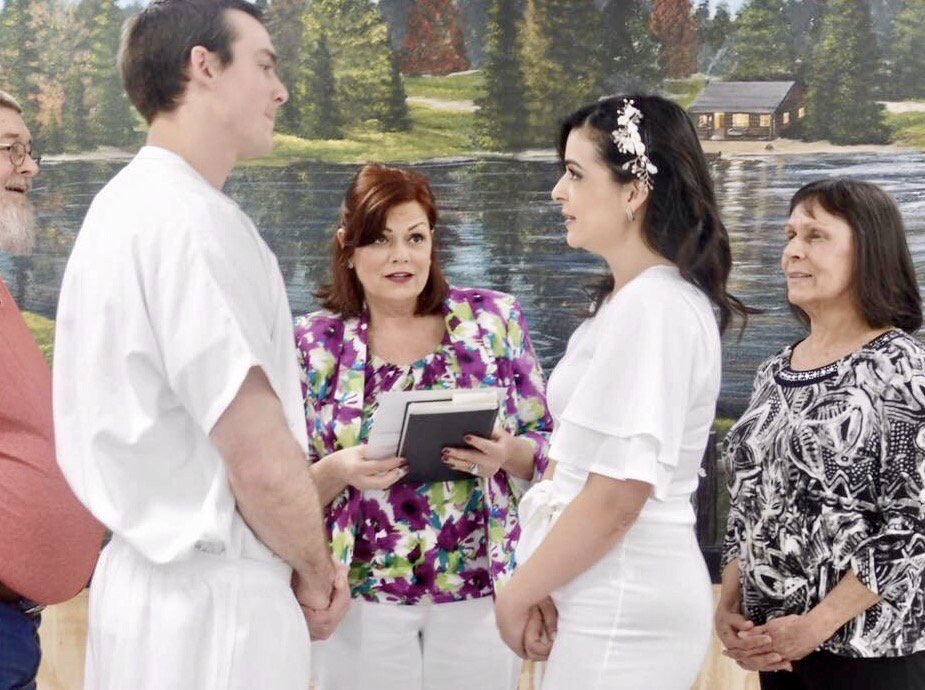 I’m well aware of any and all rules pertaining to inmate marriage within any state either I or my staff conduct ceremonies within at Prison Units. There are strict limitations pertaining to what you CAN and CANNOT do at a Prison.
I’m well aware of any and all rules pertaining to inmate marriage within any state either I or my staff conduct ceremonies within at Prison Units. There are strict limitations pertaining to what you CAN and CANNOT do at a Prison.
Although a few of my clients may wish to argue these points on occasion, please remember that my staff or myself are acting in your best interest by telling you what you can do and advising against what you cannot do.
“Why can’t I bring a ring?” Because Section K of the Administrative Directive specifically prohibits ring exchanges. There is no “rule bending” regarding Offender Property.
“Why can’t I bring a change of clothes for the inmate? I don’t want our wedding photos with him wearing Prison issued clothing.” Because once again, Offender Property guidelines strictly prohibit bringing anything in to give to the inmate.
“What can I bring?” You are REQUIRED to bring the marriage license, your current and valid state issued ID or passport, your car keys and quarters in a clear plastic bag to purchase Unit photos if they are offered.
“What can you bring?” My ID, my car keys and my Bible as well as notes inside my Bible. If you have handwritten vows or anything else written on paper, you MUST give these to me prior to entry. I will put your notes in my Bible and give them to you at the commencement of the ceremony.
Weddings “on the outside” include guests, bouquets, vendors, cake, and all of the other elements that “weddings on the inside don’t.”
The majority of my Prison wedding clients re book upon release of their loved one for Vow Renewals. 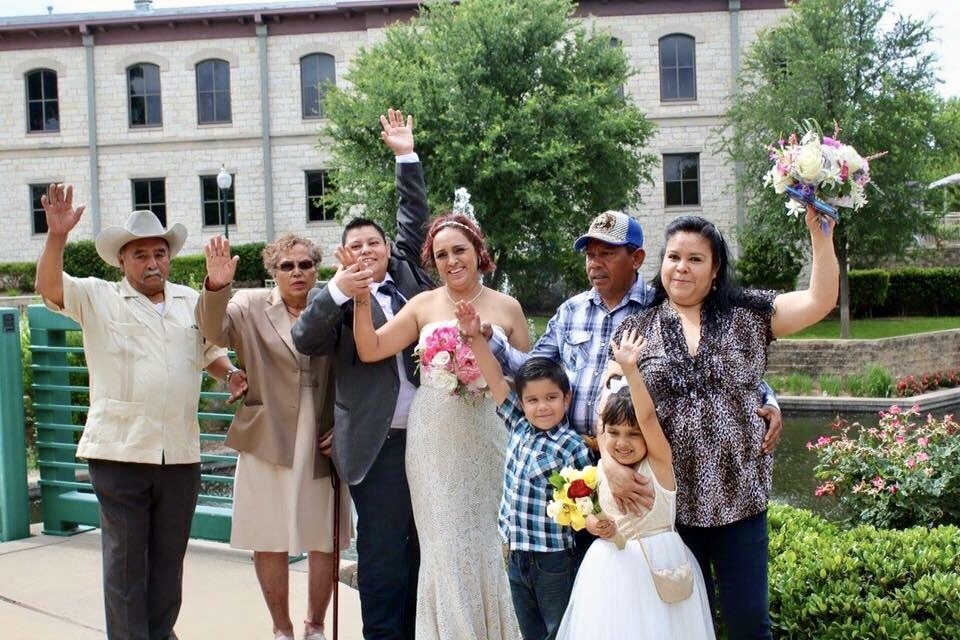
Everything you couldn’t do “on the inside” including your choice of clothing, a wedding ring, guests and the like are included at your Vow Renewal. Fees are based on distance from Fort Worth, Texas.
I hope this explains and subsequently, answers your questions and I look forward to meeting you at your Prison Wedding soon…
